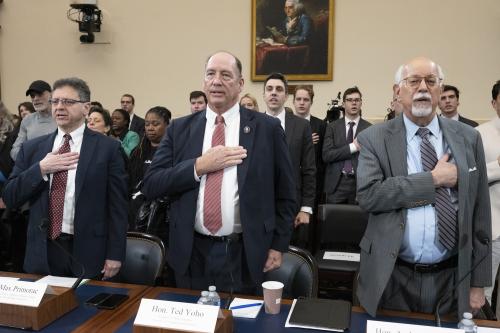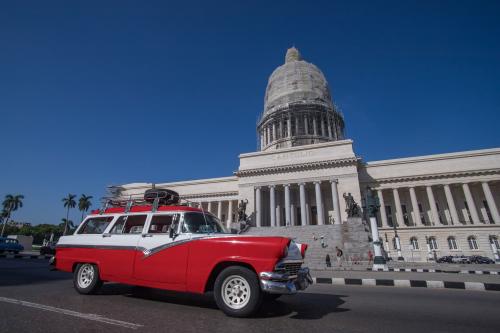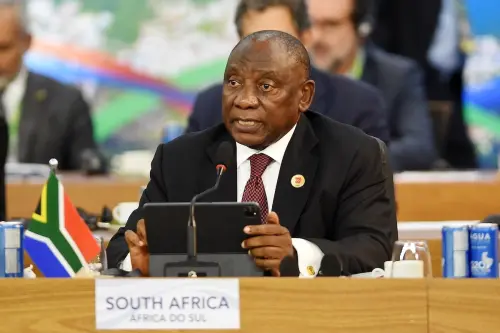The nation of Kenya was gripped by a palpable sense of excitement and outsized expectations prior to President Obama’s arrival on Friday, July 24. On the day the president arrived, offices in Nairobi were closed, banks shut down early, and the city’s emptied streets were adorned with American flags and ubiquitous posters conveying the message, “Welcome Home Obama.” One television station devoted full-time coverage to the visit.
The tenor of expectation was captured by Macharia Gaitho, a columnist for the Daily Nation, who wrote that Obama’s trip to Kenya was “the most important visit by a foreign leader since independence.” While seemingly excessive, several well-regarded business leaders strongly agreed with the sentiment.
There was no question that Obama’s visit would be a boost to Kenya’s confidence, shaken by al-Shabab’s horrific attacks on the Westgate Mall and Garissa University, and the uncertainty of the nation’s relationship with the U.S. given the International Criminal Court indictments of President Uhuru Kenyatta (since dropped due to a lack of evidence) and Vice President William Ruto. Many Kenyans have also questioned why it took Obama six years since coming into office to visit his father’s homeland.
However, all doubts about Kenya’s standing with the U.S. seemed to evaporate when President Obama bound down the steps of Air Force One and embraced a waiting President Kenyatta at the foot of the stairs. The president then received a bouquet of flowers from a nine-year-old girl and proceeded to greet the dignitaries aligned on the red carpet.
Most emotive was the president’s warm embrace of his older half-sister, Auma Obama, last in the greeting line. Auma then got into the president’s limousine and the two took off, embedded in a large train of security vehicles, for the hotel and a family reunion.
Twenty-seven years earlier, in a story that was repeated often in the press over the weekend, Auma had picked up a 25-year-old Barack Obama at Jomo Kenyatta International Airport on his first visit to Kenya. Shortly after leaving the airport, her aged VW Beetle broke down. The story added poignancy to the sight of the two leaving the airport in the presidential limousine as well as a sense that a definitive new chapter in U.S.-Kenyan relations was beginning. And, as Auma quipped two days later while introducing her half-brother for his speech to the nation, she appreciated the returned favor of a ride from the airport.
President Obama uses the energy around his visit to promote entrepreneurship
At the core of Obama’s visit was a debate over Kenya’s identity. Was the nation a “hotbed of terror” as CNN reported on the eve of Obama’s arrival, or, as President Kenyatta rebutted in his opening to the Global Entrepreneurship Summit, a “hotbed of vibrant culture, spectacular natural beauty, and infinite possibility”?
The president’s participation in the Global Entrepreneurship Summit (GES) in Nairobi underscored his belief that entrepreneurship is the “spark of prosperity,” and that people around the world, especially young people, want to start businesses to improve their lives and communities. He similarly expressed his belief in a rising continent during the trip, declaring on several occasions that “Kenya’s on the move, Africa’s on the move,” and emphasizing the country’s strong middle class, high economic growth, and entrepreneurial spirit. He also noted that, in 2006 when he visited South Korea, the Asian nation’s economy was 40 times larger than Kenya’s, and, since then, that gap has been cut in half. The president, though, was not overly optimistic: In his frank, even personal, speech to the nation, Obama still identified corruption, tribalism, and ethnicity, and a lack of investment in women and girls’ education as the country’s most significant challenges, specifically pointing out that corruption costs the nation 250,000 jobs a year.
Western and African entrepreneurs face different challenges
Against this backdrop, the Global Entrepreneurship Summit provided the rationale for Obama’s visit to Kenya. The GES, launched in 2009 in Cairo, is especially relevant in Africa where 10-12 million youth enter the labor market every year, and youth remain almost twice as likely to be unemployed as their elders. Over the course of two days at the sprawling United Nations campus on the outskirts of Nairobi, entrepreneurs from Kenya, Africa, and more than 100 countries had the opportunity to network with each other, interact with U.S. start-up executives from companies such as Airbnb and Uber, and hear from venture capitalists from Silicon Valley.
A principal theme that emerged from numerous conversations and panels was the difference in scale and experience between entrepreneurs in the U.S. and Africa. Entrepreneurs in the U.S. want to “disrupt” existing platforms to enhance their impact and value. Entrepreneurs in Africa share the desire to impact their communities and generate income, but they largely have to create systems and platforms that do not exist.
One venture capitalist from Silicon Valley commented that capital is usually invested in start-ups that already have products and have identified employees for key functions. Start-ups in Africa, however, are frequently self-funded and dependent on finding a commercial niche that enables them to be sustainable. Most will never attract venture capital, and finding skilled employees is a major problem. As one entrepreneur from Ethiopia remarked, her business is “me, myself, and I,” even though she has hired 10-20 employees to fill orders as they come in. Western entrepreneurs think about their businesses as being part of an eco-system. In Africa, it seems that entrepreneurs are more focused on being part of a value chain and finding a market for their products. As one conference participant put it, entrepreneurship in Africa is about turning challenge into opportunity.
Compelling start-ups abound around the African continent
Many African entrepreneurs at GES presented compelling stories. As Dr. Shadi Sabeh, the founder of the Brilliant Footsteps Academy in Sokoto, Nigeria, put it, “My goals are to make money, positively impact my community, and do what I love to do, which is to teach.” Sabeh’s school, which has grown to a staff of 120 and 500 students in three years, is dedicated to integrating formal and informal Islamic instruction in an effort combat extremism and promote peace in northern Nigeria.
Hello Tractor, founded by Jehiel Oliver, is a startup in Abuja, Nigeria that uses mobile phone technology and GPS to make tractors available to farmers on a rental basis to lower the cost of the machines, enhance their use, and ensure they have proper maintenance. The start-up has received $180,000 in funding and aims to service 110,000 farmers and create 1000 jobs.
Eco-pads is a start-up in Kampala, Uganda founded by Lucy Athieno with a $25,000 grant from the U.S. African Development Foundation that makes re-useable sanitary napkins available to 800 girls to enable them to stay in school. Sales have more than doubled in size over the last year.
Tamarind Nott started a company in 2012 that relies on the traditional knowledge of the Himba women in Namibia to produce a skin cream called Namibian Myrrh that is available in Namibia and, via web sales, in South Africa.
U.S. companies provide mentoring for African and global entrepreneurs
Several American companies clearly had relevance for African entrepreneurs. A representative from Uber noted that companies need to be clear about what is negotiable and what is non-negotiable. For example, given that some developing market legal systems are not ready for a shared economy, it is possible to pay for an Uber ride in Nairobi by cash (Uber also has a presence in Nigeria and South Africa).
A former Facebook representative noted that the Facebook platform was developed by engineers in Menlo Park, California for smartphone high-speed connectivity. In Lagos, however, as Facebook engineers have come to understand, most smartphones did not have enough memory and only 2G networks are available, so they have had to rework the platform for the Nigerian market. The lesson imparted here: New products should be adaptable to different environments.
Perhaps most interesting to me for African entrepreneurs was Ross Baird of the successful Village Capital who emphasized that it is essential to know where the market will be in 20-30 years and discussed how to position a company to grow into that market. As a result, Village Capital has focused on early phase investments in African start-ups at a range between $50,000 and $500,000. The firm has made 114 venture deals of less than $1 million over the last year. Village Capital has also pioneered (and recommended) peer-to-peer due diligence—in which 10-12 entrepreneurs collectively determine where their investments will have the largest impact—which has now become a key part of investment decisions. In addition, Baird noted that a focus on women entrepreneurs has also been a priority, as women-owned businesses generally have a track record of success, and last year 30 percent of Village Capital’s investments went to women-owned businesses.
Obama and Kenya
In the course of his visit, Obama signed a number of agreements related to fighting terrorism, obstructing corruption, and promoting trade and investment. Yet perhaps his most significant “deliverable” was the candor with which he spoke to the Kenyan people and his example of overcoming tremendous odds to assume the most powerful position on earth. This message also resonated with the approximately 1500 entrepreneurs who participated in GES and frequently face significant challenges in ensuring the success of their businesses.
When President Obama began his speech to the nation, he noted that he was the first U.S. president to visit Kenya. He also noted that he was the first Kenyan-American to be elected president of the United States, an observation he has rarely, if ever, publicly made before. In doing so, Obama emphasized his connection to the Kenyan people in a way that only he could and, as one Kenyan put it, redefined the Kenyan dream.
The Brookings Institution is committed to quality, independence, and impact.
We are supported by a diverse array of funders. In line with our values and policies, each Brookings publication represents the sole views of its author(s).



Commentary
Obama in Kenya: A report from the field and a recap of the Global Entrepreneurship Summit
July 29, 2015